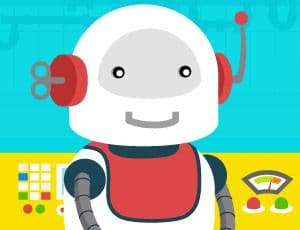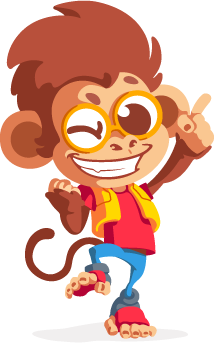Teacher's support sheet

Robot Catches Letters
The robot needs to be controlled by a very smart child! He must walk around the factory in search of the letters that form the indicated word.
The factory can be a dangerous place, be careful not to bump into the forklift or get crushed by the press.

Teacher's tips
Level of education: Elementary School
Age: 06 to 08 years old
Learning to identify the letters of the alphabet is essential for further word formation. It is one of the curricular contents of the Portuguese language discipline, mainly used in the early years of elementary school. To promote this learning, it is understood that there is a need to relate it to recreational activities. With this game, children will be able to expand their vocabulary, develop reading behavior, so that they communicate well and produce knowledge, as well as gain access to information in an autonomous, conscious and fun way.
Learner outcomes
Know the letters of the alphabet;
Understand the use of the alphabet in the construction of words;
Differentiate vowel from consonant;
Fix knowledge acquired in the classroom;
Know and identify the syllables;
Develop reading skills by reading simple syllables;
Develop attention and concentration;
Develop motor coordination;
Teachers' goals
Enable the student to identify the alphabet as a stable set of symbols that graphically represents our speech;
Provide, in a playful and creative way, the progress in the reading and writing process of children;
Expand the class's repertoire of letters and words;
Offer a playful and pleasurable proposal that allows the student to associate letters with their spelling;
Offer the game as a didactic resource to fix the content worked in the classroom;
To favor the understanding of the construction process of words through the letters;
Suggestions of approaches for the teacher
Use this game as an ally in literacy work. It is important that they play in pairs or trios, so that the exchange of knowledge takes place and further favors the development of students.
(Suggestion 1) Ask students to record all the words that appear in the game. In the classroom, compose a dictionary with this repertoire, put it on the wall to be consulted during other writing moments in the class.
(Suggestion 2) Complete the word. Write words with missing syllables on the board. Ask students to complete them and then make an illustration.
(Suggestion 3) Print the vowels and ask the students to use their imagination to color them. Use crayons, markers, gouache paint, coloring pencils.
(Suggestion 4) Draw the Hopscotch game with the vowels on the floor. When going through Amarelinha ask the children to say the name of the vowels out loud.
(Suggestion 5) Write words that have the same initial.
(Suggestion 6) Look up the word's meaning in the dictionary.
(Suggestion 7) On the board or on a printed sheet, write several syllables and ask students to form words from them.
(Suggestion 8) Work with poems and rhymes.
(Suggestion 9) Unscramble the letters to form the correct word. On a sheet of paper or on the board, write several scrambled words, they can be scrambled, but separated by syllables in the case of the initial grades, for 3rd year students the word can be completely scrambled.
(Suggestion 10) Promote word dictation.
(Suggestion 11) Use colored markers to write the alphabet in cursive and block letters. For each letter ask students to make a drawing corresponding to the initial.
(Suggestion 12) Form syllables with matchsticks, popsicle sticks or string.
(Suggestion 13) Build a memory game. On side 1 place the figure of an animal or object, on side 2 place the first letter corresponding to the object.
(Suggestion 14) Ask the students to gather caps from PET bottles, then cut and paste each letter of the alphabet inside the caps, distribute them to the students and ask them to form words and then sentences.
(Suggestion 15) Work with the hangman game.
More about the content
The games that lead students to reflect on the letters they should use to form words, provide opportunities for the appropriation of correspondences in a more pleasurable way, without the need to train syllabic patterns mechanically.
At the same time, they begin to exercise a type of orthographic reflection, when they discuss with their colleagues (or have to decide by themselves) which letters they will use to note the sound pattern of the word they want to write. These are the types of games that ESCOLA GAMES offers you, teacher.
Do not forget that it is necessary to discuss with the students about each game, before starting it, guiding them about what they are learning, as it is also important that they know that games can also be learned.
Find out below activities that help in the literacy process
Telling stories and reading to children
Make books available
Use well-illustrated activities
Ask the child to tell stories
Jokes with movable alphabet
Take advantage of situations away from home
Encourage writing stories
Promote tactile experiences
